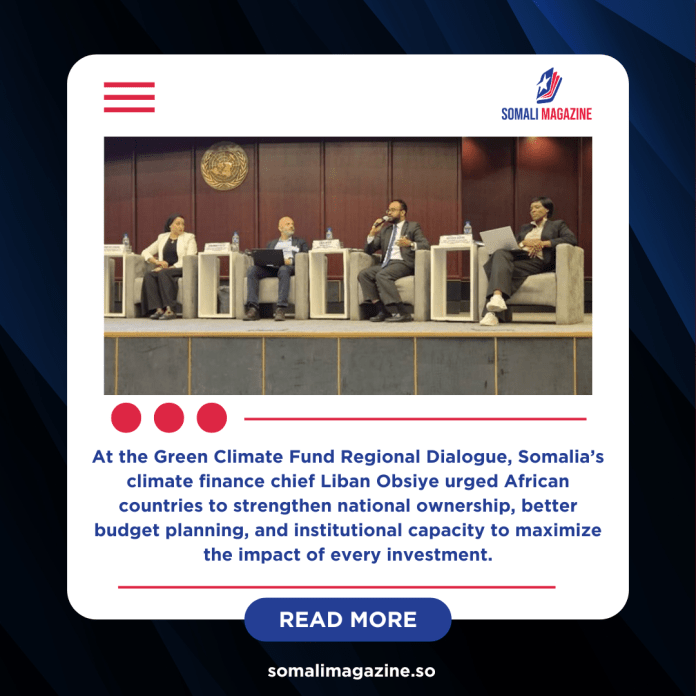Facebook Twitter (X) Instagram Somali Magazine - People's Magazine
Liban Obsiye, the Executive Director of the National Climate Fund (NCF), has called for stronger national leadership and coordination in climate finance, stressing that these elements are crucial if countries like Somalia are to benefit fully from international investments. He made these remarks during the Green Climate Fund (GCF) Regional Dialogue with Africa, which took place in Addis Ababa, Ethiopia, on Thursday.
Obsiye spoke at a session dedicated to GCF Country Platforms, where he presented Somalia’s newly developed climate finance framework. This framework, introduced through a Presidential Decree, is now under the leadership of the National Climate Fund at the Ministry of Finance. He explained that Somalia’s top priority is to secure accreditation for a national entity to directly manage GCF funds. Such a move, he said, would allow Somalia to use its own systems, cut down on costly external implementation, and at the same time strengthen national institutions.
He pointed out that Somalia’s fragile context makes it critical to maximize the value of every dollar invested. According to him, climate finance cannot just be about channeling money but must also be about ensuring that limited resources create meaningful change, particularly for vulnerable communities who are hardest hit by the effects of climate change. “In our fragile context, every dollar investment must produce more impact to build resilience for the most vulnerable. National ownership, leadership, and coordination are a must to achieve this,” Obsiye emphasized.
Beyond the question of financial resources, Obsiye also highlighted the importance of building institutional capacity. He noted that Somalia is leveraging GCF’s Readiness financing to strengthen local systems and improve its ability to deliver climate-related projects. This, he argued, will help ensure that Somalia is not only a recipient of funds but also an active player in shaping how those funds are used.
Reflecting on Africa’s wider challenges with climate finance, Obsiye said many governments across the continent face significant hurdles in mobilizing the necessary resources to deal with the growing impacts of climate change. He explained that the financing gap remains wide, and to close it, countries must rethink how they manage public resources. According to him, better budget planning, stronger domestic revenue collection, and more effective use of public spending are essential.
He also argued that climate finance should not be seen as a stand-alone effort but as part of a broader economic strategy. Because climate change directly affects key sectors like agriculture, water, and energy, it has a disproportionate impact on public finances. For this reason, Obsiye urged governments to include climate finance mobilization as a central part of their macroeconomic strategies rather than treating it as a separate issue. “Governments must include climate finance mobilization as part of their broader macroeconomic strategies, given its disproportionate impact on public expenditure in Africa,” he said.
On the sidelines of the regional dialogue, Obsiye met with senior GCF officials, including Catherine Koffman, the Fund’s Director for the Africa Region. These meetings focused on strengthening Somalia’s engagement with the Green Climate Fund and positioning the country to better access financial support for its climate priorities.
Obsiye’s message was clear: while international support remains critical, African countries and fragile states like Somalia in particular must take the lead in shaping how climate finance is managed and delivered. By ensuring stronger national ownership, improving coordination among institutions, and aligning climate finance with broader economic planning, Somalia hopes to secure not only more funding but also greater impact from every investment made.

